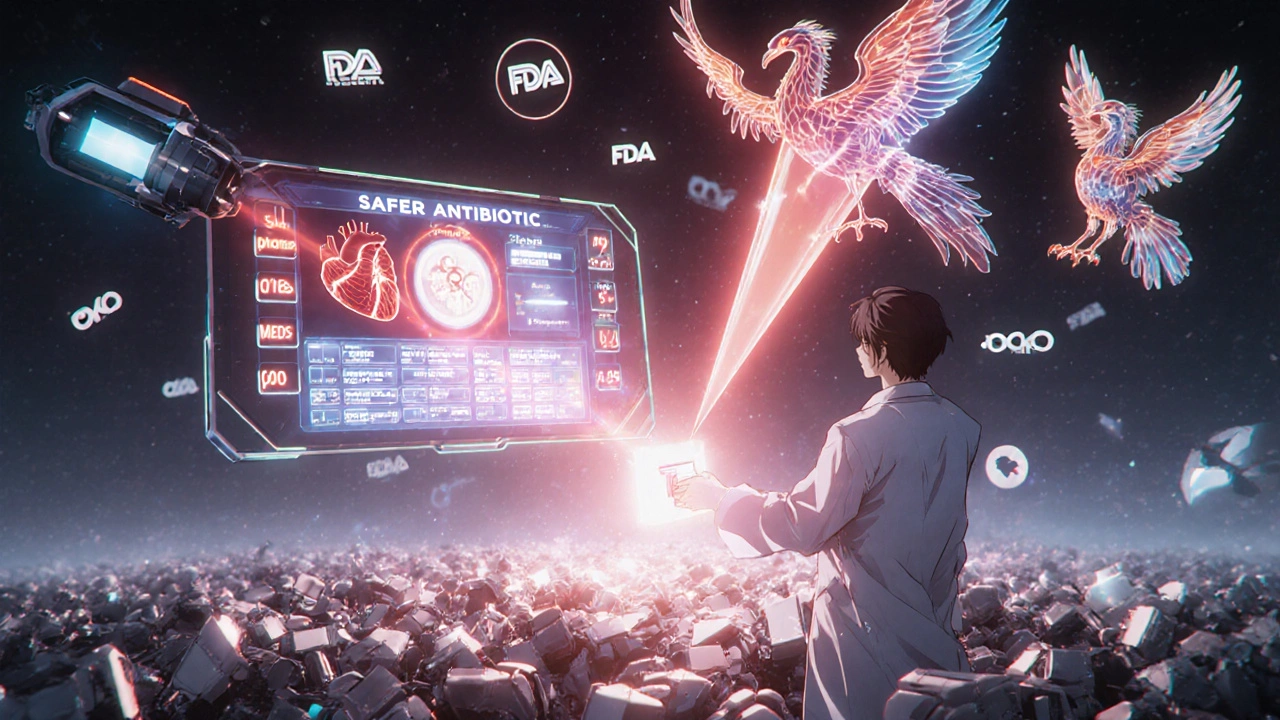Macrolide Antibiotic QT Prolongation Risk Calculator
This tool estimates your risk of QT prolongation when taking macrolide antibiotics (azithromycin, clarithromycin, erythromycin). Based on your inputs, it calculates your risk level and provides personalized guidance. Note: This is not a substitute for medical advice. Always consult your doctor before taking any new medication.
Your Risk Assessment
When you take an antibiotic like azithromycin or clarithromycin for a sinus infection or bronchitis, you’re probably thinking about getting better - not about your heart. But for some people, these common drugs can quietly disrupt the heart’s rhythm, leading to a dangerous condition called QT prolongation. It’s not common, but when it happens, it can be life-threatening. Understanding this risk isn’t about scaring you off antibiotics - it’s about making sure you and your doctor know when to be cautious.
What Exactly Is QT Prolongation?
Your heart beats because of electrical signals that travel through muscle tissue. The QT interval on an ECG measures how long it takes for the heart’s lower chambers (ventricles) to recharge between beats. If that interval gets too long, the heart can misfire, leading to a chaotic rhythm called Torsades de pointes (TdP). This isn’t just a blip on a monitor - it’s a type of ventricular tachycardia that can collapse into cardiac arrest if not treated fast. Macrolide antibiotics - including erythromycin, clarithromycin, and azithromycin - interfere with potassium channels in heart cells, specifically the hERG channel. This blocks the flow of potassium out of the cell during repolarization, slowing down the heart’s recovery phase. The result? A longer QT interval. It’s not the same as a slow heartbeat - it’s a timing error in the electrical reset, and that’s what makes it dangerous.Not All Macrolides Are the Same
If you’ve been prescribed one of these antibiotics, you might wonder: which one is safest? The answer isn’t simple, but it’s clear that risk varies. - Clarithromycin carries the highest risk. It doesn’t just block potassium channels - it also strongly inhibits the liver enzyme CYP3A4. That means it can raise levels of other drugs you’re taking, including other QT-prolonging medications. The FDA requires a black box warning on clarithromycin labels for this reason. - Erythromycin is less potent at blocking potassium channels than clarithromycin, but it causes more stomach upset. Vomiting and diarrhea can lead to low potassium (hypokalemia), which itself prolongs the QT interval. So even if the drug isn’t the strongest blocker, it creates conditions that make arrhythmias more likely. - Azithromycin was once considered the safest option because it doesn’t interfere much with liver enzymes. But that changed after a 2012 study tracking over a million prescriptions found a 2.85 excess death per 1,000 courses compared to amoxicillin. The risk is small, but real - especially in the first few days of use. The FDA still lists it as a drug with potential QT prolongation, even without a black box warning.Who’s Most at Risk?
Most people take macrolides without any heart issues. But for certain groups, the risk jumps dramatically. Here are the key red flags:- Women - Nearly 7 out of 10 cases of TdP from macrolides occur in women. The reasons aren’t fully understood, but hormonal differences and naturally longer QT intervals may play a role.
- Age 65+ - Older adults have 2.4 times higher risk. Aging affects how the heart handles electrical signals and how drugs are cleared from the body.
- Baseline QTc over 450 ms - If your ECG already shows a long QT, adding a macrolide can push you into danger. That’s a 4.7-fold increase in risk.
- Heart failure or structural heart disease - Damaged heart muscle doesn’t recover well from electrical stress. This raises TdP risk by over five times.
- Low potassium or magnesium - Electrolyte imbalances are a major trigger. Even mild hypokalemia increases risk by 3.1 times.
- Taking other QT-prolonging drugs - Combining macrolides with drugs like antiarrhythmics, antidepressants, or antifungals adds up. Each extra drug increases risk by 1.8 times.
And here’s the tricky part: some people have silent genetic mutations in their hERG channels. They’ve never had symptoms, but their hearts are more sensitive. When they take a macrolide, it’s like flipping a switch they didn’t know was there.

When Should You Get an ECG?
You don’t need an ECG before every antibiotic. But if you have two or more of the risk factors listed above, your doctor should consider one. The American College of Cardiology recommends:- Baseline ECG if you have ≥2 risk factors
- Repeat ECG if your QTc goes above 470 ms (men) or 480 ms (women)
- Also repeat if QTc increases by more than 60 ms from your baseline
That 60 ms jump is critical. It’s not just about the number - it’s about how much the drug changed your heart’s timing. A rise of that size is a strong signal to stop the drug.
Some clinics now use portable ECG devices like the CardioCare QT Monitor, which gives accurate readings in under a minute. That’s a game-changer for patients on long-term therapy or those with multiple risk factors.
What If You’re Already Taking Other Medications?
Many people don’t realize they’re on another QT-prolonging drug. Common ones include:- Fluoroquinolones (ciprofloxacin, levofloxacin)
- Antidepressants (citalopram, escitalopram)
- Antifungals (fluconazole, ketoconazole)
- Antiarrhythmics (amiodarone, sotalol)
- Antipsychotics (haloperidol, ziprasidone)
During the early days of the COVID-19 pandemic, azithromycin was sometimes paired with hydroxychloroquine - a combination that, on average, prolonged QTc by 26.2 ms. That’s enough to push many people into dangerous territory. It’s a stark reminder: drug interactions aren’t theoretical. They’re deadly.
If you’re on any of these, talk to your doctor before starting a macrolide. Sometimes, switching to a non-macrolide antibiotic like doxycycline or amoxicillin is the safest move.
What’s Being Done to Make These Drugs Safer?
Regulators are paying attention. Since 2013, the FDA has required new antibiotics to undergo QT testing before approval. The European Medicines Agency followed with similar rules in 2018. That’s why newer drugs are being designed with cardiac safety in mind. One example is solithromycin - a next-gen macrolide that showed 78% less Ikr blockade than clarithromycin in trials. Unfortunately, development was stopped due to liver toxicity. But the research didn’t go to waste. Scientists are now using those findings to design safer compounds. There’s also the Macrolide Arrhythmia Risk Calculator (MARC), launched in 2024. It uses 12 factors - age, sex, kidney function, current meds, electrolytes, and more - to estimate your personal risk of TdP. In validation studies, it was 89% accurate. That’s not perfect, but it’s a big step toward personalized prescribing.
What Should You Do?
If you’re prescribed a macrolide antibiotic:- Don’t panic. The risk is low for healthy people.
- Ask your doctor: “Do I have any risk factors for QT prolongation?”
- Let them know all the medications and supplements you take - even over-the-counter ones.
- If you have a family history of sudden cardiac death before age 50, mention it.
- If you feel dizzy, faint, or notice your heart racing or skipping beats while taking the drug, stop it and seek help immediately.
There’s no need to avoid macrolides entirely. They’re effective, often the best choice for certain infections, and save lives. But like all medicines, they come with trade-offs. The goal isn’t to eliminate them - it’s to use them wisely.
Alternatives to Macrolides
For many common infections, safer options exist:- Respiratory infections: Amoxicillin, doxycycline, or levofloxacin (if no contraindications)
- Sexually transmitted infections: Doxycycline or ceftriaxone (azithromycin is still used for chlamydia, but alternatives are available)
- Skin infections: Cephalexin or clindamycin
Antibiotic choice should be based on the infection, local resistance patterns, and your personal health profile - not just convenience or cost. Your doctor can help weigh the risks and benefits.
Final Thoughts
Macrolide antibiotics aren’t dangerous for most people. But they’re not harmless either. The real issue isn’t the drug - it’s the mismatch between a one-size-fits-all prescription and the complex biology of individual hearts. As medicine moves toward more personalized care, tools like risk calculators and point-of-care ECGs will help us make smarter choices.If you’re healthy, young, and taking azithromycin for a simple infection, your risk is minimal. But if you’re older, on multiple meds, have heart disease, or have low potassium - that’s when you need to pause and ask questions. Your heart doesn’t always tell you when something’s wrong. Sometimes, the only way to protect it is to know the risks before you start the pill.
Can azithromycin cause heart problems?
Yes, azithromycin can prolong the QT interval and, in rare cases, trigger a dangerous heart rhythm called Torsades de pointes. The risk is low in healthy people but increases significantly if you have other risk factors like older age, heart disease, low potassium, or are taking other QT-prolonging drugs. Studies show a small but real increase in cardiovascular death during the first five days of use.
Which macrolide antibiotic is safest for the heart?
Among macrolides, azithromycin carries the lowest cardiac risk because it has minimal effect on liver enzymes and weaker potassium channel blockade. Clarithromycin poses the highest risk due to strong Ikr blockade and CYP3A4 inhibition. Erythromycin is in between but can cause electrolyte imbalances that raise risk. Still, no macrolide is completely safe for people with multiple heart risk factors.
How do I know if my QT interval is long?
You can’t feel a long QT interval. It’s only visible on an ECG. Normal QTc is under 450 ms for men and under 460 ms for women. If your QTc is over 470 ms (men) or 480 ms (women), or if it increases by more than 60 ms from your baseline, that’s a red flag. Your doctor should order an ECG if you have two or more risk factors for arrhythmias.
Should I avoid macrolides if I have a family history of sudden cardiac death?
Yes, you should. Up to 20% of people who develop drug-induced TdP have undiagnosed congenital long QT syndrome. A family history of sudden death before age 50, especially during exercise or stress, could signal an inherited channelopathy. Even if your ECG looks normal, your heart may be more sensitive to potassium-blocking drugs like macrolides. Tell your doctor - this changes your risk profile.
Can electrolyte imbalances make macrolide heart risks worse?
Absolutely. Low potassium (hypokalemia) and low magnesium increase the risk of TdP by 3.1 times and 2.8 times, respectively. Macrolides like erythromycin can cause vomiting and diarrhea, which worsen these imbalances. If you’re on a macrolide and have diarrhea, vomiting, or are taking diuretics, your doctor should check your electrolytes. Replenishing potassium and magnesium can reduce risk significantly.
Are there newer antibiotics without QT prolongation risk?
Yes, but they’re not widely available yet. Researchers are developing new macrolide derivatives like solithromycin that block bacterial proteins without affecting heart potassium channels. Solithromycin showed 78% less Ikr blockade than clarithromycin in trials, but development was paused due to liver toxicity. Other non-macrolide options like doxycycline or amoxicillin are already safe and effective for many infections. Always ask your doctor if a safer alternative exists for your condition.







Post A Comment